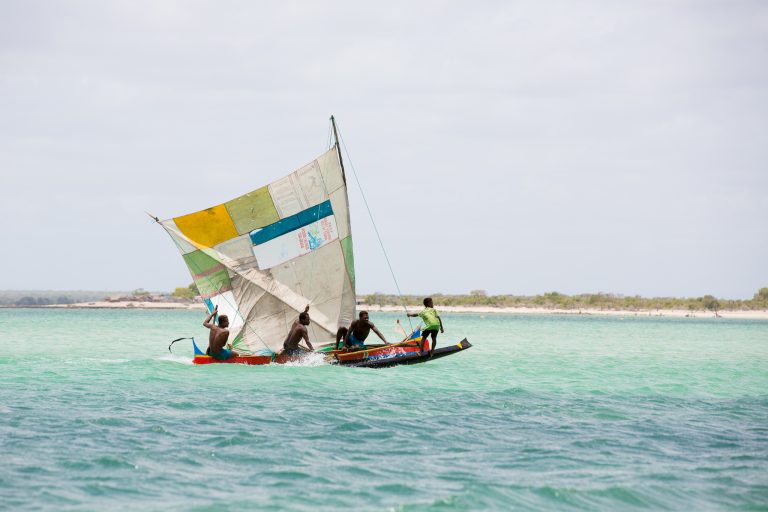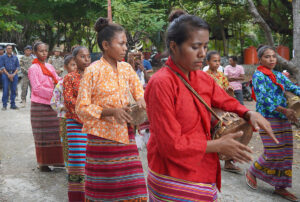- Small-scale fisheries are small in name only. Half a billion people – 7% of the global population – are at least partly dependent on them for food, employment and income. They are the largest group of ocean users, have contributed the least to the ocean emergency, and are among the most affected by it. Yet their needs, roles and rights are often ignored, and they are generally sidelined or excluded from major policy discussions that directly affect their lives and livelihoods.
- At the UN Oceans Conference (UNOC) in Lisbon, small-scale fishers are calling on decision-makers to listen to them, consult with them and include them more in policy-making and discussions.
- The conference presents a critical opportunity to find a more equitable approach to managing the world’s oceans and to enshrine human rights in the UN’s aim to “mobilise action and start a new chapter of global ocean action”.
- Small-scale fishing organisations from Africa, America, Asia, Europe and the Pacific are holding an event on 28 June to launch their call to action at the UN Ocean Conference. Come to the event: ‘A call to action from artisanal fishing communities, vital users of the oceans’.
Small-scale fishers are the largest group of ocean users on the planet, and their fisheries provide food or income to half a billion people. Yet in decision-making processes, their needs often come second to large corporate interests, and they are generally excluded from policy decisions that disproportionately affect their lives and livelihoods.
Without solid action now, the Lisbon conference threatens to further undermine community interests. UNOC’s final draft declaration, entitled ‘Our ocean, our future, our responsibility’, fails to recognise the vast contribution that small-scale fisheries make to food security, employment, income and ocean protection and even endorses initiatives that may undermine this vital role. The declaration emphasises the intention to ‘develop and promote innovative financing solutions to drive the transformation to sustainable ocean-based economies’. But we don’t see how proposed initiatives could benefit coastal and fishing communities.
Sweeping proclamations urging ‘global ocean action’ are meaningless if they fail to ensure inclusion of the biggest group of ocean users. This is why we are calling on decision-makers to involve coastal communities and small-scale fishers’ organisations more in important decision-making spaces like UNOC, and to adopt a human rights-based approach to marine conservation. We want to see development policies that prioritise support for small-scale fisheries in UNOC discussions and declaration, and beyond.
Small-scale fishers from five continents have launched a global call to action to ensure their voices are heard by decision-makers at UNOC. They are asking governments and world leaders to protect and increase support for small-scale fisheries.
They are calling on decision-makers to:
- Urgently secure preferential access and increase co-management of coastal areas
- Guarantee and promote the participation of women in fisheries
- Protect small-scale fisheries from competing blue economy sectors
- Increase transparency and accountability in fisheries management
- Increase support to communities, especially young people, to deal with the consequences of climate change
Join our UNOC side-event
Small-scale fishers from Africa, America, Asia, the Pacific and Europe, who represent more than 30 organisations, invite you to a breakfast event on 28 June, to launch a small-scale-fisher global declaration calling for world leaders at UNOC to act now. Join this event: A call to action from artisanal fishing communities, vital users of the oceans, in person or online (just click to join meeting or add to calendar here), and hear the voices of the least represented group of ocean users at UNOC, who are the most affected by its outcomes.
Quotes from small-scale fishers representatives:
Gaoussou Gueye, President of CAOPA (Senegal):
“We are concerned about the marginalisation of small-scale fisheries within the blue economy strategies of our countries. We cannot survive if we have to compete with powerful, polluting, and environmentally destructive sectors in the marine and coastal environment. In the face of this threat, we call on governments to adopt a precautionary approach, and to say, ‘do not give the green light to a destructive blue economy!’”
Micheline Dion Somplehi, President of the Union of Women Fish processors cooperatives USCOFEPCI (Cote d’Ivoire/Ivory Coast):
“Artisanal fishing is as much about women as men. But their contribution is often invisible, while their working conditions are disastrous. It is essential that governments make a visible and sustained commitment to recognising them as key players in the fishing industry, who are at the origin of many innovations that enable better use of our resources for the benefit of our populations. For this to happen, women must have access to financing, fish resources and social well-being. It is under these conditions that we will be able to protect these oceans, which are the lifeblood of our existence.”
Alhafiz Atsari, KNTI (Indonesia):
“Small-scale fishers (SSF) are forced to live with giants. The giants are fishing vessels using destructive fishing gear, such as bottom trawlers. They take up a lot of space. They are greedy and reckless. And they destroy everything in the ocean. These destructive giants are colonial products that were introduced to Indonesia on the assumption that SSF are unable to produce and process fish efficiently. SSF are powerless to confront them nor chase them away. We are forced to live with them.”
David Chacon Rojas: President of CoopeTarcoles R.L. (Costa Rica)
“Where there is hunger there is no conservation”
Maria Carrillo: Coordinator from the Women Shrimp Processors Association in Barra del Colorado (Costa Rica)
“It seems that we women from the coasts and seas, and our work, are invisible to the world”
Quotes from supporting organisations:
Annie Tourette, Head of Advocacy at Blue Ventures (Global):
“Small-scale fishers employ more people than all other sectors of the ocean economy combined.They are the group most affected by ocean governance decisions, but are excluded from many policy discussions Coastal communities and small-scale fishers do not have a seat at the decision-making table, but are far from being passive victims of the ecological and climate emergencies. They are frontline defenders of nature and biodiversity, and the world leaders need to listen to them now.”
Beatrice Gorez, Coordinator for CFFA (Global):
“With the focus of UNOC being on innovation, the final conference statement should recognise the effective innovations, based on local and traditional knowledge, introduced by small-scale fishing communities, to tackle key challenges such as improving fisheries management and conservation, improving working and living conditions, accessing good quality raw material, or making better use of renewable energy, particularly for fish processing activities. These innovations are helping coastal fisheries dependent communities to become more resilient.”
Vivienne Solis Rivera, CoopeSoliDar R.L. (Costa Rica)
“Small-scale fisheries are threatened strongly by the blue economy movement that concentrates interest on the economics of marine resources. Small-scale fisheries are a way of life and they need an integral perspective that needs to go beyond economics to be able to survive. The world will remember this when people will reach a market and fish will not be there.”
Dr Hugh Govan, Adviser Advocacy and Policy, the LMMA Network (Global):
“The theme of the conference is innovation. What would actually be innovative is governments and donors recognising the important role that coastal fishing communities already play, not only in feeding the world, but in managing these vital resources and habitats. Examples of communities managing fisheries resources and coastal ecosystems in collaboration with governments are increasing across the globe. But what is urgently needed is far more commitment and ambition from governments to recognise and protect the rights of these forgotten millions from the impacts of industrial fishing and unbridled development.”
























